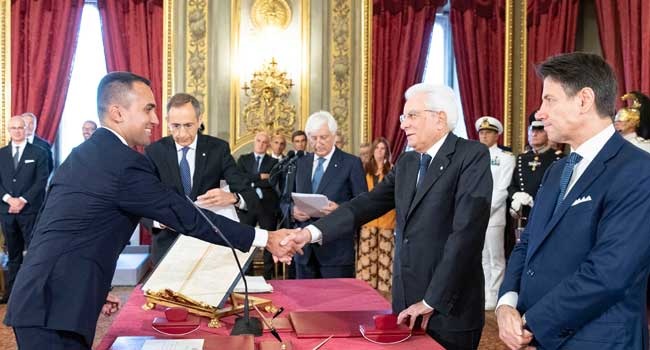Italy PM Conte Launches New Government
President Sergio Mattarella on Thursday swore in Italy’s new pro-European government, heralding a fresh start for the eurozone’s third-largest economy as the far-right falls from power.
Brussels warmly welcomed the coalition between the anti-establishment Five Star Movement (M5S) and center-left Democratic Party (PD), which is expected to markedly improve rocky relations between Europe and Rome.
“We’re ready to give our utmost for the country,” M5S head Luigi Di Maio, the new foreign minister, said.
Prime Minister Giuseppe Conte’s government still faces votes in parliament on Monday and Tuesday.
First on the cabinet’s to-do list is the 2020 budget, which has to be submitted to parliament by the end of September, and then to Brussels by October 15.
The pick of the PD’s Brussels-savvy Roberto Gualtieri as finance minister was hailed as “extremely positive, especially for the relationship with the EU” by Lorenzo Codogno, the former chief economist at the Italian Treasury Department.
European Commission President Jean-Claude Juncker congratulated Conte and said Italy’s new political era came at “an important moment for our Union”, adding that he was sure Rome would play a “front-line” role on key issues.
Italy has put forward former center-left premier Paolo Gentiloni as its candidate for the incoming European Commission.
PD chief Nicola Zingaretti said it was an “excellent choice for Italy, which returns to playing a leading role in Europe”.
The previous coalition between the M5S and far-right Matteo Salvini’s anti-immigrant League had fought bitterly with Brussels over its big-spend budget and critics had bemoaned Rome’s sidelining in the EU halls of power.
The markets welcomed the new cabinet, with Milan’s FTSE Mib stock market up 0.5 percent after the swearing-in ceremony.
US rating agency Fitch warned however that Italy would quickly need to provide “clarity on important choices of fiscal and economic policy”.
‘Anti-Salvini’
The new cabinet is the youngest ever in Italy’s post-war history — the average age being 47 — and has more ministers from the country’s disadvantaged south than the wealthy north.
Of the 21 ministers, nine hail from the PD, 10 from the M5S, one from the small left-wing Free and Equals party, and one has no affiliation with any political party — the new interior minister.
Political watchers have warned the tie-up between the Movement and PD — bitter foes until just weeks ago — is fragile.
“We are very aware that the forces that make up this government have harshly opposed each other over the years,” PD heavyweight and new culture minister Dario Franceschini said.
“The path ahead is difficult, but… we’ve agreed with Di Maio that this will not be a government of strife”.
New interior minister Luciana Lamorgese, a former Milan security chief, takes over from firebrand Salvini — the social media populist who pulled the League from the previous coalition last month, collapsing the government.
Salvini had hoped to send Italy straight to the polls to take advantage of his soaring popularity figures.
On Thursday he predicted the new government “won’t last long”.
“We’ll oppose it in parliament, in the town halls, in the town squares, and then finally we’ll vote, and we’ll win,” he said.
Posting a picture of a crucifix, he insisted he was the man to protect Italy’s “values, culture, identity, freedom”.
Arcigay, Italy’s biggest LGBT association, hailed the return of the equal opportunities minister post in the cabinet — absent in the last government — saying it was urgent to “combat hatred” fomented by the right during its 14-months in power.
Salvini was reported to have refused to be in place at the interior ministry to hand over the keys to his successor.
Lamorgese “is the anti-Salvini,” said the Repubblica daily.
“She has no social networks. She won’t ever be seen doing live Facebook videos from the rooftop of the interior ministry.”
Lamorgese will, however, be tasked with handling Italy’s divisive immigration issue, a subject that won Salvini votes as he cracked down on charity ships rescuing people attempting the perilous Mediterranean crossing from Africa to Europe.
AFP




